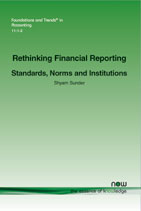Rethinking Financial Reporting: Standards, Norms and Institutions
Shyam Sunder, Yale University, USA, shyam.sunder@yale.eduAbstract
Since the passage of the US federal securities laws more than eight decades ago, much regulatory effort has been devoted to improving financial reporting in business, government and not-for-profit organizations. Yet, evidence on improvements or abatement of misreporting by error or intent remains scarce. In the context of this experience, it may be useful to explore what we might mean by better financial reporting, and how we might define and implement processes to move in that direction. A broad agreement on the way ahead seems necessary to make progress.
Creating and sustaining institutions that follow a stable and conservative process for gradually adjusting the prevailing practices toward any long-term shifts may help evolve a better financial reporting environment. This approach departs from the tendency to issue new rules, often disregarding the lessons of practice, that has created much confusion and failures in financial reporting over the past century. The eagerness to deal with transaction innovations through new pronouncements ends up fueling the cycle of more innovations, misrepresentations and abuse. The enormous resources and attention devoted to written rules have been accompanied by waning professional responsibility for good judgment and regard for practice and practicality. This work argues for targeting a better balance between top-down written rules and emergent social norms as reflected in business and accounting practice through restraining activist institutions of accounting. Suggestions from exploration of whether and how better social norms can be engineered are only preliminary at this time.
Rethinking Financial Reporting: Standards, Norms and Institutions
What are the properties of a good financial reporting regime? There are three broad approaches to defining better financial reporting based on attributes, goals, and practice. The first specifies some attributes of good reporting. A second approach is to focus on goals of society or of some specified individuals or groups. Looking to practice for guidance on defining and understanding the financial reporting regime is the third major approach. These three approaches – attributes, goals, and practice – are not mutually exclusive. It is unlikely that any one of them is entirely satisfactory by itself; they complement one another. Better Financial Reporting argues for such a syncretic attitude to financial reporting regime.
